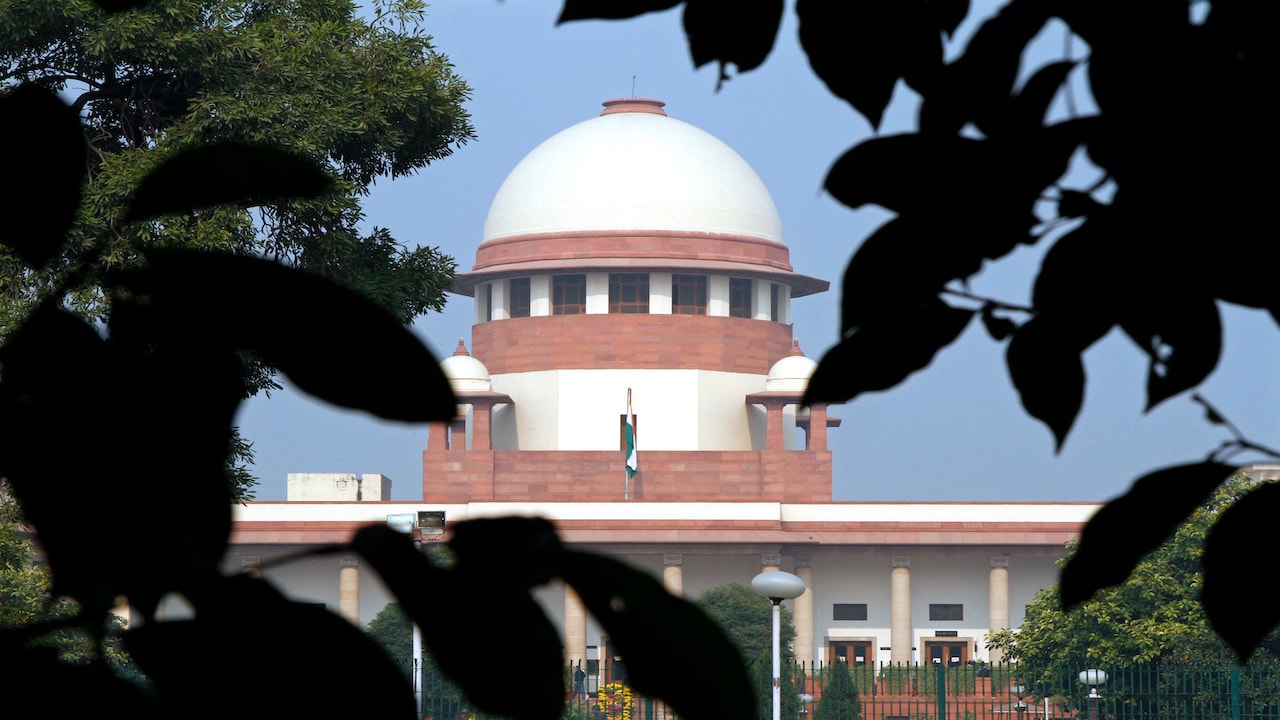Advertisement|Remove ads.
SC pulls up banks for filing cheque bounce cases far from borrowers’ location, calls it harassment
The Supreme Court’s remarks come amid rising complaints from small traders and borrowers who allege that banks and financial institutions are using jurisdictional loopholes to file cheque bounce and recovery cases in distant courts, forcing them into expensive and time-consuming legal battles. The apex court’s move to examine the issue could bring much-needed clarity on how such cases should be filed and heard across the country.

Expressing displeasure over the “misuse of law” and “harassment” meted out to small-time borrowers by financial institutions and banks by lodging cheque bounce cases at distant locations in the country, the Supreme Court on Thursday said it would examine the issue and settle the law.
A bench of Justices Surya Kant and Joymalya Bagchi expressed shock over a case in which one Golla Naraesh Kumar Yadav sought the transfer of a case lodged by Kotak Mahindra Bank before the chief judicial magistrate at Chandigarh to a court of metropolitan magistrate in Adoni of Kurnool district in Andhra Pradesh.
Appearing for Yadav, the bench was informed by advocate P Mohith Rao that the bank has lodged the case at Chandigarh despite all transactions having taken place in Andhra Pradesh, which is creating difficulties for the petitioner.
He said that the borrower of the credit facilities from the bank regularly paid the loan instalment but the case was lodged due to a small default.
The bench asked the counsel appearing for the bank as to why the complaint was lodged against Yadav in Chandigarh when the entire transaction had taken place in Andhra Pradesh.
The counsel for the bank said that they have an office in Chandigarh which deals with the loan for which the petitioner is a guarantor.
“Just because you have an office in Chandigarh, you will lodge a complaint there. This is unfair and harassment of small-time borrowers.” “What makes you think that you will not get justice in Andhra Pradesh? Chandigarh courts are not sitting idle,” Justice Kant told the counsel for the bank.
Rao told the bench that this is a problem which is happening day in and day out, and the apex court is flooded with cases where litigants, who are sometimes small borrowers, have to seek transfer of the cases lodged against them.
“They file cases in Delhi, Calcutta or any other city while transactions normally have taken place in some other distant part of the country,” he submitted.
Justice Kant told the bank’s counsel, “You are like an octopus. You have offices everywhere, so does it mean you will file cases here and there? We are opening courts everywhere but you still file cases at distant places, just to harass the borrowers. Where is the access to justice?” The counsel for the bank said the complaint was filed under the provisions of the Negotiable Instrument Act and the 2015 amendment to the law provided for it.
Justice Bagchi said the question is not of territorial jurisdiction but in transfer cases, the court normally looks at the convenience of the parties.
Justice Kant intervened and told the bank, “Just because you can file a complaint anywhere in the country where you have a collection centre, does not mean you will harass these small-time traders or borrowers.” The bench said, “It means if transactions took place in Srinagar, you will file a complaint in Kanyakumari or Coimbatore. This was not the intent of the legislation. It is a misuse of the law. We will examine this issue and pass orders and set the law.” The top court allowed the petition of Yadav and transferred the case to the court in Andhra Pradesh.
It asked Rao to find out how many complaints the bank has filed in Chandigarh, which court is examining them and the status of those cases.
The case pertained to a Cotton trading company situated in Andhra Pradesh which obtained credit facilities like overdraft in 2021 from the bank through its branch situated at Adoni in Kurnool district.
Yadav stood as one of the guarantors for the transaction.
However, in April, 2023 the bank sent a recall notice to the borrower and Yadav, demanding the return of the total amount due in the credit facilities as the borrower had defaulted in paying the interest instalments and repayment of the amount in the loan facility granted.
Thereafter, litigation between the borrower and the bank started in several judicial forums, including the debt recovery tribunal.
A bench of Justices Surya Kant and Joymalya Bagchi expressed shock over a case in which one Golla Naraesh Kumar Yadav sought the transfer of a case lodged by Kotak Mahindra Bank before the chief judicial magistrate at Chandigarh to a court of metropolitan magistrate in Adoni of Kurnool district in Andhra Pradesh.
Appearing for Yadav, the bench was informed by advocate P Mohith Rao that the bank has lodged the case at Chandigarh despite all transactions having taken place in Andhra Pradesh, which is creating difficulties for the petitioner.
He said that the borrower of the credit facilities from the bank regularly paid the loan instalment but the case was lodged due to a small default.
The bench asked the counsel appearing for the bank as to why the complaint was lodged against Yadav in Chandigarh when the entire transaction had taken place in Andhra Pradesh.
The counsel for the bank said that they have an office in Chandigarh which deals with the loan for which the petitioner is a guarantor.
“Just because you have an office in Chandigarh, you will lodge a complaint there. This is unfair and harassment of small-time borrowers.” “What makes you think that you will not get justice in Andhra Pradesh? Chandigarh courts are not sitting idle,” Justice Kant told the counsel for the bank.
Rao told the bench that this is a problem which is happening day in and day out, and the apex court is flooded with cases where litigants, who are sometimes small borrowers, have to seek transfer of the cases lodged against them.
“They file cases in Delhi, Calcutta or any other city while transactions normally have taken place in some other distant part of the country,” he submitted.
Justice Kant told the bank’s counsel, “You are like an octopus. You have offices everywhere, so does it mean you will file cases here and there? We are opening courts everywhere but you still file cases at distant places, just to harass the borrowers. Where is the access to justice?” The counsel for the bank said the complaint was filed under the provisions of the Negotiable Instrument Act and the 2015 amendment to the law provided for it.
Justice Bagchi said the question is not of territorial jurisdiction but in transfer cases, the court normally looks at the convenience of the parties.
Justice Kant intervened and told the bank, “Just because you can file a complaint anywhere in the country where you have a collection centre, does not mean you will harass these small-time traders or borrowers.” The bench said, “It means if transactions took place in Srinagar, you will file a complaint in Kanyakumari or Coimbatore. This was not the intent of the legislation. It is a misuse of the law. We will examine this issue and pass orders and set the law.” The top court allowed the petition of Yadav and transferred the case to the court in Andhra Pradesh.
It asked Rao to find out how many complaints the bank has filed in Chandigarh, which court is examining them and the status of those cases.
The case pertained to a Cotton trading company situated in Andhra Pradesh which obtained credit facilities like overdraft in 2021 from the bank through its branch situated at Adoni in Kurnool district.
Yadav stood as one of the guarantors for the transaction.
However, in April, 2023 the bank sent a recall notice to the borrower and Yadav, demanding the return of the total amount due in the credit facilities as the borrower had defaulted in paying the interest instalments and repayment of the amount in the loan facility granted.
Thereafter, litigation between the borrower and the bank started in several judicial forums, including the debt recovery tribunal.
Read about our editorial guidelines and ethics policy













/filters:format(webp)https://news.stocktwits-cdn.com/large_silver_coins_bullion_jpg_a5e7d87dc2.webp)
/filters:format(webp)https://news.stocktwits-cdn.com/vivekkrishnanphotography_58_jpg_0e45f66a62.webp)
/filters:format(webp)https://news.stocktwits-cdn.com/large_Getty_Images_2211161503_jpg_6a27495b3f.webp)
/filters:format(webp)https://st-everywhere-cms-prod.s3.us-east-1.amazonaws.com/unnamed_jpg_9dff551b50.webp)
/filters:format(webp)https://news.stocktwits-cdn.com/large_cannabis_OG_jpg_41f888db63.webp)
/filters:format(webp)https://st-everywhere-cms-prod.s3.us-east-1.amazonaws.com/Prabhjote_DP_67623a9828.jpg)
/filters:format(webp)https://news.stocktwits-cdn.com/large_solana_crypto_OG_jpg_493deb9d88.webp)
/filters:format(webp)https://news.stocktwits-cdn.com/large_pfizer_ceo_albert_bourla_jpg_ca272cdef6.webp)
/filters:format(webp)https://news.stocktwits-cdn.com/large_M_and_A_deals_acquisitions_resized_jpg_a56d5b5e28.webp)